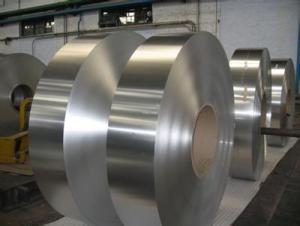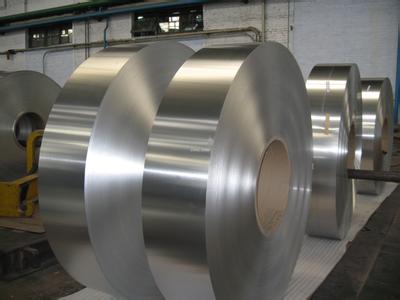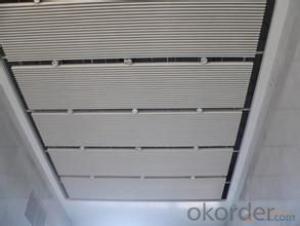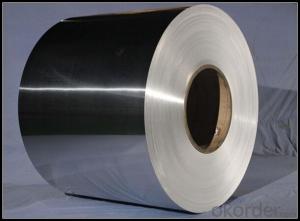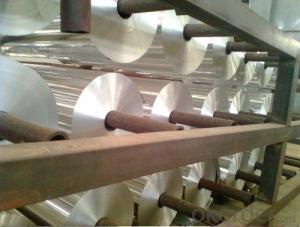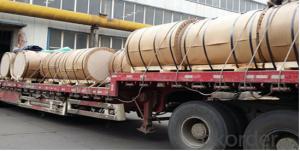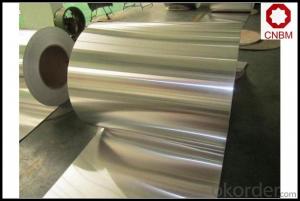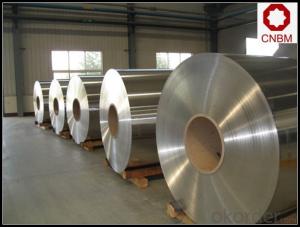Aluminum Coil Price Per Pound Weather Strip Seal
- Loading Port:
- China Main Port
- Payment Terms:
- TT or LC
- Min Order Qty:
- 8 m.t.
- Supply Capability:
- 2000 m.t./month
OKorder Service Pledge
OKorder Financial Service
You Might Also Like
Structure of Aluminium Weather Strip Seal Description:
They can be used in many field,such as: Building, curtain wall, ceiling, panels, transformers, food packaging, air conditioning, condenser, air filter, refrigerators, washing machines, solar energy, automobile manufacturing, ship manufacturing, machinery manufacturing, electric equipment such as cosmetic packaging, machinery manufacturing industry, can also be used in power plants, chemical anti-corrosion insulation in petrochemical industry, etc.
Main Features of Aluminium Weather Strip Seal:
a. Excellent corrosion resistence
b. Satisfactory anodizing
c. Conversion coating finishing characteristics
d. It is unmatched by any other commercial aluminum alloy in workability.
e. Readily to welding ,brazing, and soldering.
Images of Aluminium Weather Strip Seal:
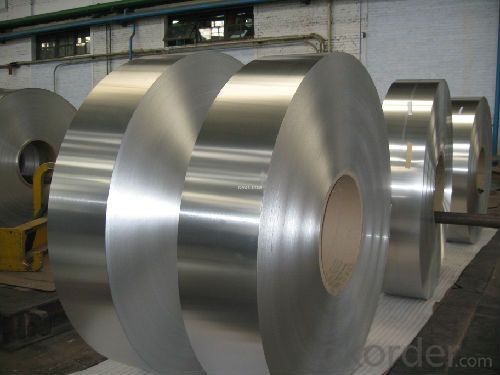
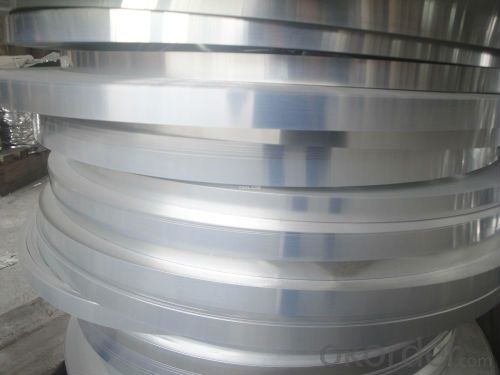
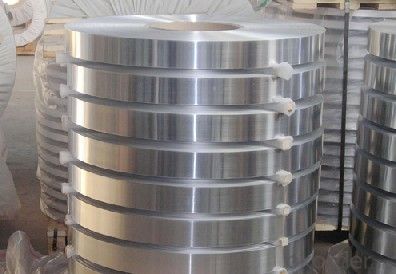
Aluminium Weather Seal Specification:
Item | Aluminum coil,Aluminum strip |
Standard | GB/T3190-2008,GB/T3880-2006,ASTM B209,JIS H4000-2006,etc |
Material | 1060,1200,1100,a1100P,3003,3004,5052,5652,5154,5254,5454,5083,5086,5056,5456, 2A12,2024,2014,6061,6063,7075,etc |
Thickness | 0.1-200mm |
Width | 2-2200mm |
Temper | T3-T8,O-H112,T351-T851,etc |
Unit weight | 5-15 tons per coil |
Price term | Ex-Work,FOB,CNF,CFR,CIF,FCA,DDP,DDU,etc |
Payment Term | TT,L/C,Western Union |
MOQ | 8000Kg |
FAQ of Aluminium Weather Seal:
a.What is monthly capacity
---CNBM is one stated own company and our monthly capacity is about 2000tons.
b. Now which countries do you export your goods?
---Now we export to South East Asia,Africa, North America,South America ect.
- Q: What is the electrical conductivity of aluminum coils?
- Aluminum coils have a relatively high electrical conductivity. Renowned for its impressive conductivity, aluminum boasts a rating of approximately 37.7 x 10^6 siemens per meter (S/m). As a result, aluminum is an exceptional option for a range of electrical uses, particularly in coil production. The exceptional conductivity of aluminum facilitates the efficient transmission of electric current through the coils, rendering them a fitting choice for electrical wiring, transformers, motors, and other electrical apparatus.
- Q: How are aluminum coils coated for color matching and aesthetic purposes?
- Aluminum coils are commonly coated for color matching and aesthetic purposes through a process known as coil coating. Coil coating is a continuous and highly automated process that involves applying a layer of paint or coating onto the aluminum coil surface. The first step in the coil coating process is cleaning the aluminum coil thoroughly to remove any dirt, grease, or oxidation. This is typically done using a combination of chemical cleaning agents and mechanical scrubbing methods to ensure a clean and smooth surface. After the cleaning process, a primer is applied to the aluminum coil. The primer acts as a bonding agent, improving the adhesion of the subsequent layers of paint or coating. The primer also helps to prevent corrosion on the aluminum surface. Once the primer is applied, the aluminum coil passes through a series of rollers, where the desired color coating is applied. This color coating can be achieved through various methods, such as coil coating, spray coating, or powder coating. Coil coating, being the most common method, involves the application of a liquid paint or coating onto the metal coil surface. The coating is then cured or dried using heat, ensuring proper adhesion and durability. To achieve color matching and aesthetic purposes, the paint or coating used is often customized to specific color palettes or customer requirements. This customization can be achieved by using a wide range of pigments and additives that alter the color, texture, and gloss level of the coating. Additionally, aluminum coils can also be coated with specialized coatings to enhance their aesthetic properties. For instance, there are coatings available that give the appearance of natural wood or stone, providing a more visually appealing finish. Overall, the process of coating aluminum coils for color matching and aesthetic purposes involves thorough cleaning, priming, and the application of customized paint or coatings. This ensures that the aluminum coils meet the desired aesthetics while also providing durability and protection against corrosion.
- Q: I need help with 3 main ideas for a aluminum and copper chloride lab. I need evidence for these 3 ideas that what happened was a chemical reaction.
- Change in mass, change in color, change in temp, change in ...
- Q: How do aluminum coils contribute to architectural design flexibility?
- Aluminum coils contribute significantly to architectural design flexibility due to their unique properties and versatility. Firstly, aluminum coils are lightweight, which makes them easier to handle and install compared to other materials like steel or concrete. This characteristic allows architects to explore more creative and innovative designs without worrying about the weight limitations. It also enables the construction of large and complex structures, providing architects with greater freedom in their designs. Secondly, aluminum coils offer a wide range of surface finishes and colors. They can be painted, anodized, or coated with various materials, allowing architects to achieve desired aesthetic effects and match the building's appearance with its surroundings or the intended architectural style. This wide range of finishes enables architects to experiment with different visual effects, textures, and patterns, thereby enhancing the overall design flexibility. Furthermore, aluminum coils possess excellent corrosion resistance properties. This durability ensures that the architectural elements made from aluminum coils can withstand harsh weather conditions, such as rain, snow, or UV radiation, without deteriorating over time. This enhanced lifespan and low maintenance requirement make aluminum coils an attractive choice for architects seeking long-lasting and sustainable design solutions. Additionally, aluminum coils can be easily formed, bent, or shaped into various profiles and dimensions. This malleability allows architects to create customized architectural elements that fit specific design requirements, such as curved facades, intricate detailing, or irregular shapes. The ability to shape aluminum coils according to the architects' vision enables the realization of unique and distinctive designs that stand out in the architectural landscape. Lastly, aluminum coils are recyclable and environmentally friendly. The use of aluminum in architectural design aligns with sustainable practices, as it can be recycled repeatedly without losing its properties. This aspect appeals to architects and clients who prioritize eco-friendly design solutions and wish to reduce their carbon footprint. In conclusion, aluminum coils contribute significantly to architectural design flexibility by offering lightweight construction, a wide range of surface finishes, excellent corrosion resistance, malleability, and recyclability. These characteristics empower architects to push the boundaries of design, create visually stunning structures, and deliver sustainable and long-lasting architectural solutions.
- Q: Can the color coated aluminum roll be bent easily and won't break?
- Weathering resistance. The weight of a unit volume is the lightest of all metal materials. It is widely used in fields such as pigments, balcony packaging, and is not susceptible to corrosion. It is durable and beautiful in appearance. Specially applied to the interior of public places, colour coated aluminium rolls have become one of the most popular top decorative materials: polyester coated aluminum rolls (PE). According to the surface film forming structure, fluorocarbon coating can be divided into two kinds: traditional fluorocarbon and nano fluorocarbon coating. The biggest advantage is that the strength of the fluorocarbon coating is incomparable. It is a new type of material which has recently emerged in the field of doors and windows.
- Q: This question asks about the common applications of aluminum coil in everyday life.
- <p>Aluminum coil is widely used in daily life due to its lightweight, corrosion resistance, and thermal conductivity. It's commonly used in construction for roofing and siding, in the automotive industry for car parts, and in the packaging industry for food and beverage cans. It's also used in electrical applications like transformers and wiring due to its good conductivity. In the kitchen, aluminum foil is used for cooking and food storage, and in the HVAC industry for heat exchangers and ductwork. Its versatility makes aluminum coil an essential material in many industries and everyday applications.</p>
- Q: What is the weight of an average aluminum coil?
- The weight of an average aluminum coil can vary depending on its dimensions and thickness. However, a typical aluminum coil can weigh anywhere between 1,000 to 10,000 pounds (450 to 4,500 kilograms).
- Q: What are the potential applications of coil-stucco aluminum coils?
- Coil-stucco aluminum coils have a wide range of potential applications due to their unique properties and characteristics. Some of the potential applications of coil-stucco aluminum coils include: 1. Building and construction: Coil-stucco aluminum coils are commonly used in the construction industry for various purposes. They can be used for roofing, cladding, and siding applications, providing durability, versatility, and aesthetic appeal to buildings. The stucco finish on the coils adds texture and enhances the overall appearance of the building. 2. Transportation industry: Coil-stucco aluminum coils are also used in the transportation industry for manufacturing trailers, truck bodies, and other vehicles. Aluminum is lightweight, yet strong, making it an ideal material for reducing the weight of vehicles and increasing fuel efficiency. The stucco finish on the coils provides additional strength and resistance to scratches and abrasions. 3. Appliances and electronics: The coil-stucco aluminum coils are suitable for manufacturing appliances and electronics due to their corrosion resistance and thermal conductivity. Aluminum coils are commonly used in refrigerators, air conditioning units, and other household appliances. The stucco finish provides an added layer of protection against wear and tear. 4. Signage and advertising: Coil-stucco aluminum coils are widely used in the signage and advertising industry for making outdoor signs, billboards, and displays. The stucco finish enhances the visibility of the signs by reducing glare and reflections. Additionally, aluminum is a weather-resistant material, making it suitable for outdoor applications. 5. Packaging industry: Coil-stucco aluminum coils find applications in the packaging industry as well. Aluminum is a non-toxic and non-reactive material, making it suitable for packaging food and beverages. The stucco finish adds an attractive texture to the packaging material, making it visually appealing. 6. Industrial applications: Coil-stucco aluminum coils are used in various industrial applications such as manufacturing equipment, storage tanks, and processing systems. The excellent corrosion resistance, high thermal conductivity, and strength make aluminum coils a preferred choice in industries where these properties are crucial. Overall, the potential applications of coil-stucco aluminum coils are diverse and extensive. The unique properties of aluminum, combined with the stucco finish, make these coils suitable for a wide range of industries, including construction, transportation, appliances, signage, packaging, and industrial applications.
- Q: Why does the coated aluminum coil have thickness requirement for membrane?
- The purpose of coating is to protect the surface of aluminum coil and make it more aesthetic. The thickness of membrane is closely related to the keep years of products made by aluminum coil.
- Q: This question asks for the current market price of aluminum coils.
- <p>The price of aluminum coils can vary significantly based on factors such as grade, thickness, width, and market conditions. As of my last update, prices fluctuate daily due to global supply and demand, economic indicators, and geopolitical events. For the most accurate and up-to-date pricing, it's best to consult with metal suppliers or check commodity exchanges like the London Metal Exchange (LME). Prices are typically quoted in dollars per metric ton and can range from a few thousand to several thousand dollars depending on the aforementioned factors.</p>
Send your message to us
Aluminum Coil Price Per Pound Weather Strip Seal
- Loading Port:
- China Main Port
- Payment Terms:
- TT or LC
- Min Order Qty:
- 8 m.t.
- Supply Capability:
- 2000 m.t./month
OKorder Service Pledge
OKorder Financial Service
Similar products
Hot products
Hot Searches
Related keywords
